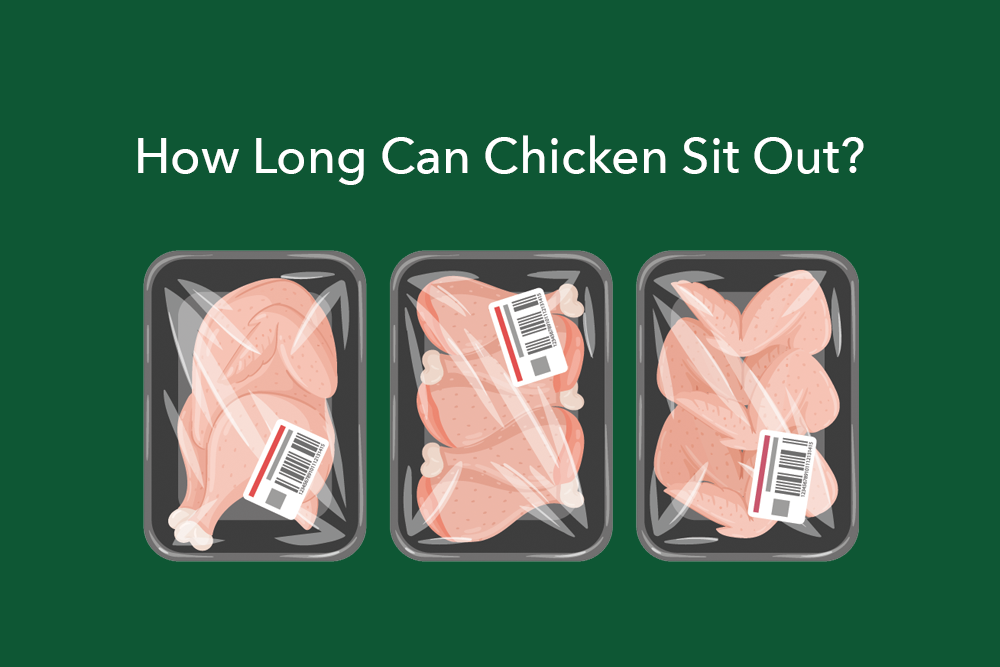Chicken is a popular and versatile protein, but improper storage can turn it into a food safety hazard. Whether raw, cooked, or thawing, chicken must be stored correctly to prevent the growth of harmful bacteria. So, how long can chicken sit out before it becomes unsafe to eat? In this guide, we’ll provide clear answers, essential storage tips, and signs to recognize spoiled chicken.
How Long Can Chicken Sit Out at Room Temperature?
The USDA (United States Department of Agriculture) recommends that raw or cooked chicken should not sit out at room temperature for more than 2 hours. If the temperature is above 90°F (32°C), the time reduces to just 1 hour.
Why Only 2 Hours?
Bacteria, such as Salmonella and Escherichia coli (E. coli), thrive between 40°F and 140°F — this range is called the “Danger Zone.” When chicken sits in this range for too long, bacteria multiply rapidly, increasing the risk of foodborne illness.
What If Chicken Has Been Left Out Overnight?
If raw or cooked chicken is left out for more than 2 hours, it should be thrown away. Even if it doesn’t have a bad smell or appearance, the bacteria can still be present and harmful.
How Long Can Raw Chicken Sit Out?
Raw chicken is more vulnerable to bacterial growth than cooked chicken due to its moisture content. Here’s what you need to know:
At Room Temperature
- 2 hours max, or 1 hour if above 90°F
In the Refrigerator
- Safe for 1–2 days
In the Freezer
- Can last up to 12 months if properly sealed
What Happens If Raw Chicken Sits Out Too Long?
- Texture Change: The meat may become slimy or sticky.
- Odor Change: Spoiled raw chicken has a strong, foul smell.
- Discoloration: It may turn gray, yellow, or have spots of mold.
If you notice any of these signs, it’s best to throw it away.
How Long Can Cooked Chicken Sit Out?
Cooked chicken is less prone to spoilage than raw chicken, but it still follows the 2-hour rule. After cooking, bacteria can still grow if the chicken is left out too long.
At Room Temperature
- Safe for 2 hours, or 1 hour if over 90°F
In the Refrigerator
- Store in an airtight container for 3–4 days
In the Freezer
- Lasts up to 4 months
What If Cooked Chicken Has Been Left Out Overnight?
If cooked chicken has been left out overnight, it is no longer safe to eat. Even if it looks and smells fine, bacteria may have grown to unsafe levels. Throw it away.
How to Store Chicken Properly
Proper storage of chicken is crucial for food safety. Here’s how to store raw and cooked chicken effectively:
1. Raw Chicken
- In the Fridge: Keep raw chicken in its original packaging or place it in an airtight container to avoid cross-contamination. It lasts 1–2 days in the fridge.
- In the Freezer: Place raw chicken in a freezer-safe bag, removing as much air as possible to prevent freezer burn. Label the date. It can last up to 12 months in the freezer.
2. Cooked Chicken
- In the Fridge: Place cooked chicken in an airtight container to prevent it from drying out. It stays fresh for 3–4 days in the fridge.
- In the Freezer: Use freezer-safe bags or containers to store cooked chicken for up to 4 months. Label the container with the storage date.
Can You Leave Chicken Out to Thaw?
While it may be tempting to thaw chicken on the counter, this method is unsafe. Chicken should never be thawed at room temperature for more than 2 hours. Here are safer ways to thaw chicken:
- In the Refrigerator: Safest method, but it takes time (24 hours for a full chicken).
- In Cold Water: Submerge the chicken in a leak-proof bag in cold water. Change the water every 30 minutes.
- In the Microwave: Fastest method, but it may cause uneven cooking.
How to Tell If Chicken Has Gone Bad
Here are signs that your chicken has spoiled:
- Foul Smell: A sour, ammonia-like smell is a key indicator of spoiled chicken.
- Texture: Fresh chicken is firm. If it feels slimy or sticky, it’s no longer safe to eat.
- Color Change: Raw chicken should be pink. If it’s gray, yellow, or has spots, it’s gone bad.
- Mold Growth: If you see mold, throw it out immediately.
Tips for Chicken Safety
- Follow the 2-Hour Rule: Never leave chicken (raw or cooked) at room temperature for more than 2 hours.
- Store Correctly: Use airtight containers to store chicken in the fridge or freezer.
- Don’t Taste Test: Spoiled chicken can harbor bacteria that don’t always have a smell, so don’t taste it.
- Use a Thermometer: When cooking chicken, ensure the internal temperature reaches 165°F to kill bacteria.
FAQs: Chicken Safety at Room Temperature
Conclusion
To avoid foodborne illness, it’s crucial to know how long chicken can sit out. The golden rule is no more than 2 hours at room temperature (or 1 hour if it’s hot outside). Raw chicken can be stored in the fridge for 1–2 days and cooked chicken for 3–4 days. If in doubt, always err on the side of caution and throw it out. Proper storage, timely refrigeration, and thorough cooking are key to keeping chicken safe and delicious for your next meal.
Disclaimer: The content on Wellness Derive is for informational purposes only and not a substitute for professional medical advice, diagnosis, or treatment. Always consult a healthcare provider for medical concerns.



